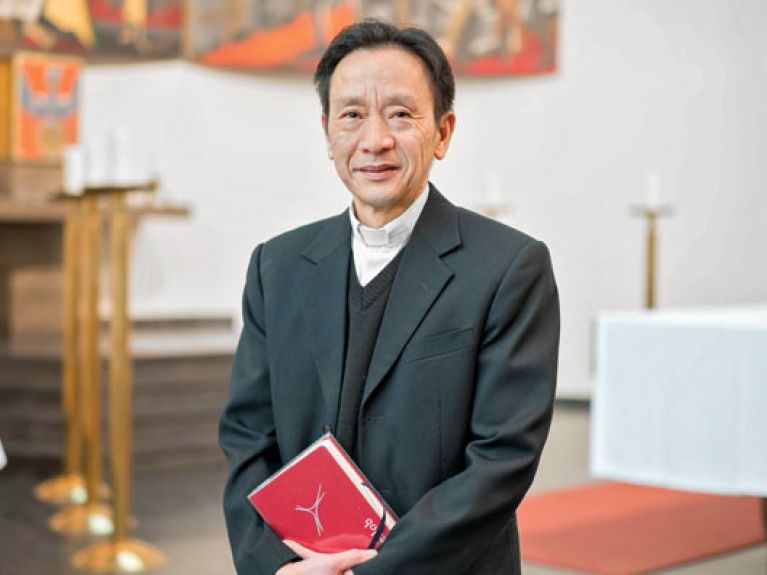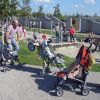We have arrived
The Vietnam War ended some forty years ago and brought the first major wave of refugees from outside Europe to Germany. They were followed later by refugees from Sri Lanka. What became of them? Two examples.

Ngoc Ha Do
Chaplain in Berlin
Only a person who has found his peace can smile like that. Chaplain Do is standing in the church of the Catholic parish of St Martin in Berlin-Reinickendorf. Most of his parishioners, like him, have come from Vietnam. More than 1,300 Catholics of Vietnamese origin have now settled in Germany’s capital, he says in almost perfect German. Many of them were among the first wave of non-European refugees who landed in Germany. The Vietnamese are now regarded as a very well integrated group.
Ha Do’s parents emigrated from North Vietnam to South Vietnam in the 1950s, when the country was still divided. He himself was born there in 1960. However war and persecution caught up with them. After the takeover in 1975, the Communists regarded the family as collaborators of the overthrown South Vietnamese government. In the end there was only one option: the young man had to leave the country. In 1982 Do and an uncle fled north by sea. After three days, they were picked up by the German humanitarian vessel Cap Anamur and taken to the Philippines. One year later he was able to travel to Germany.
The first thing to do in Berlin was to learn German. This was a huge challenge but Do progressed well. In 1985 he started an apprenticeship as an electrician, completed this successfully and then joined the Berlin diocese. The then 29 year old had decided to become a priest. He completed secondary education and studied theology. In 2001 Do’s great wish was fulfilled when he was ordained. “I am very grateful.”
Umeswaran Arunagirinathan
Doctor in Bad Neustadt
Umeswaran Arunagirinathan has published the first chapter of his life as a book. In Alone and on the run – How a Tamil boy came to Germany, he describes how, as the child of a Tamil family, he experienced the horrors of civil war between the Singhalese majority and the Tamil minority in Sri Lanka. When he turned twelve, his mother decided in sheer desperation to have him sent by boat to the safety of a foreign country. He arrived in Germany in September 1991 after an odyssey of almost one year, and initially was able to stay with an uncle in Hamburg as a refugee minor. He quickly came to feel at home there, was a good student, became head boy and wanted to stay in Germany. However his asylum application was declined three times, on the grounds that at the time the family could also have gone to the safe southern part of Sri Lanka.
“I would have read the book in one go,” wrote one reviewer on Amazon, “if I hadn’t had to keep stopping to dry my tears of heartfelt sympathy.” The second chapter in the life of Umeswaran Arunagirinathan has a better start. With the help of teachers, fellow students and their parents, his deportation was prevented. Umes, as his friends call him, studied medicine in Lübeck and today he is a doctor in the Bad Neustadt heart clinic. He obtained German citizenship in 2009 and regularly sends money to his parents. His book is a compulsory text at his former school in Hamburg and elsewhere. And if ever anyone is hostile towards him because of his ancestry or the colour of his skin, he attempts “to establish a dialogue and to break down the unfamiliarity”. Umeswaran Arunagirinathan is not only persistent and determined, he is also relentlessly optimistic.

